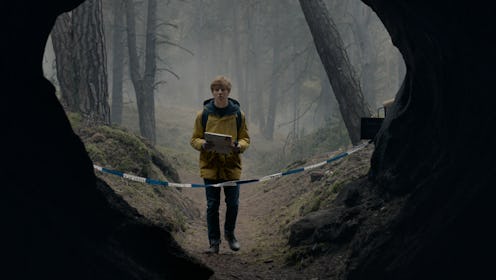Entertainment
This Creepy New Netflix Show Isn't Actually The German 'Stranger Things,' But It's Great

A missing boy. A small town. Lights that flicker ominously for inexplicable reasons. A shady nuclear plant. A group of kids who stay out too late at night and venture to forbidden places. Their parents, who have secrets of their own. A streaming deal with Netflix. With those details, it would be easy to assume I'm describing Stranger Things. But while Dark, Netflix's first German-language original series, does indeed have all of those elements, it would be doing this wildly inventive show a disservice to reductively label it the German Stranger Things, as Dark has a chilly, mind-bending sensibility all its own.
From the pilot's opening shot depicting a jarringly unemotional suicide to the mesmerizing opening credits (which are soundtracked by a song so haunting that my friend told me he skips the intro), it’s clear that Dark isn’t much interested in, well, lightness, or much of the nostalgic levity that punctuates Stranger Things' more ominous flirtations with the supernatural. Even when it comes to the gorgeous cinematography, which includes constant breathtaking shots of forests disappearing into fog, shadowy caves, and rain-drenched buildings, Dark literally lives up to its name.
The show, created by Baran bo Odar and Jantje Friese, who caught Netflix's eye with the 2014 hacker thriller Who Am I, follows four families in the small (fictional) town of Winden — which is crucially surrounded by lush forest lands, a nuclear plant, and a vast network of caves — as they grapple with the fallout after a teenage boy, Erik, goes missing. It doesn't take long — only an episode — before a second boy has vanished, sending the town into a full-on panic. What unfolds over the next nine episodes is incredibly complicated and too spoilery to describe in detail, but it involves uncovered family secrets, multi-generational interlocking stories, time travel, ruminations on determinism and free will, mentions of the antichrist, and a heavy dose of emotional montages set to music for good measure.
While the pilot, which leans more heavily on exploring the feuds, romances, and friendships between Winden's teenagers as they venture into the town's forests and caves looking for Erik's hidden drug stash, will feel a little familiar to fans of Eleven and co.'s antics, it's once Dark has finished laying the groundwork for its expansive and intricately plotted story that things start to get really interesting.
That's because the show isn't just interested in the present day (well, the near-future: the opening scenes of Dark are set in 2019). It becomes clear pretty early on that this is a show that is deeply fascinated by theories about how the past affects the future, the future affects the past, and a whole bunch of mind-scrambling questions involving time. Before long, we're being transported through extensive flashbacks to Winden in 1986 (yes, there is some '80s nostalgia here, though it's got a more distinctly German flavor) and 1953, and following the tangled web of affairs, slights, conspiracies, and cover-ups different characters are involved in at different phases of their lives.
Jumping between three different eras also heightens the show's emotional impact, allowing us to learn about a character through his former selves: A teenage rebel haunted by the mysterious disappearance of his brother grows up and joins the police force to right the perceived wrongs he witnessed in the investigation into that unsolved crime; a precocious young girl in 1953 becomes an ambitious businesswoman who must confront the seedy and illegal underbelly of her new job in 1986; by 2019, she's tormented by the seemingly irreversible (or is it?) passage of time and has a new mission.
Seeing the same character played by different actors in different time periods drives home Dark's emphasis on how the decisions we make over the course of our lives forever change us, and how the outcomes of those decisions can sometimes propel people to go to great lengths to attempt to change the past. But even with the introduction of wormholes and a time machine, can one ever really change the past?
It's heady stuff, and Dark unabashedly leans into its kookier time-travel theories without feeling too pretentious, though those with a low tolerance for voiceovers about how "time is an eternal beast that cannot be defeated" or references to Nietzsche's eternal recurrence and the death of god might not be thrilled with the direction the show takes. But Dark is deeply interested in the philosophical questions its time-travel antics pose, and it succeeds in giving them weight by keeping its characters grounded as they begin to confront things they (and we) have been made to believe are impossible.
"This might sound strange," one character says after realizing he may have unwittingly traveled back in time, "but what year is it?" He hears the answer and walks away in stunned silence, and it's the details — his modern puffer jacket juxtaposed with the tailored suit of the watchmaker he visits in 1953, the way both characters react in quiet disbelief and confusion — that prevent the show from going off the rails as the plot crescendoes into a dizzying knot of connected interactions that will make viewers want to build their own crazed web of photos connected by string like the one a mysterious character affixes to his hotel room wall.
Like Lost, Westworld, and even This Is Us, Dark is a mystery-box show that derives suspense from and becomes compulsively watchable thanks to its structure. But unlike those shows, the complicated puzzle that is Dark's plot underscores the show's overarching themes, which question time's sequential nature. And aside from surface similarities, the general tone and themes that Dark is concerned with are really nothing like those of Stranger Things at all. There may be no Demogorgons here, but the residents of Winden don’t need literal demons when they have to contend with the many versions of themselves.